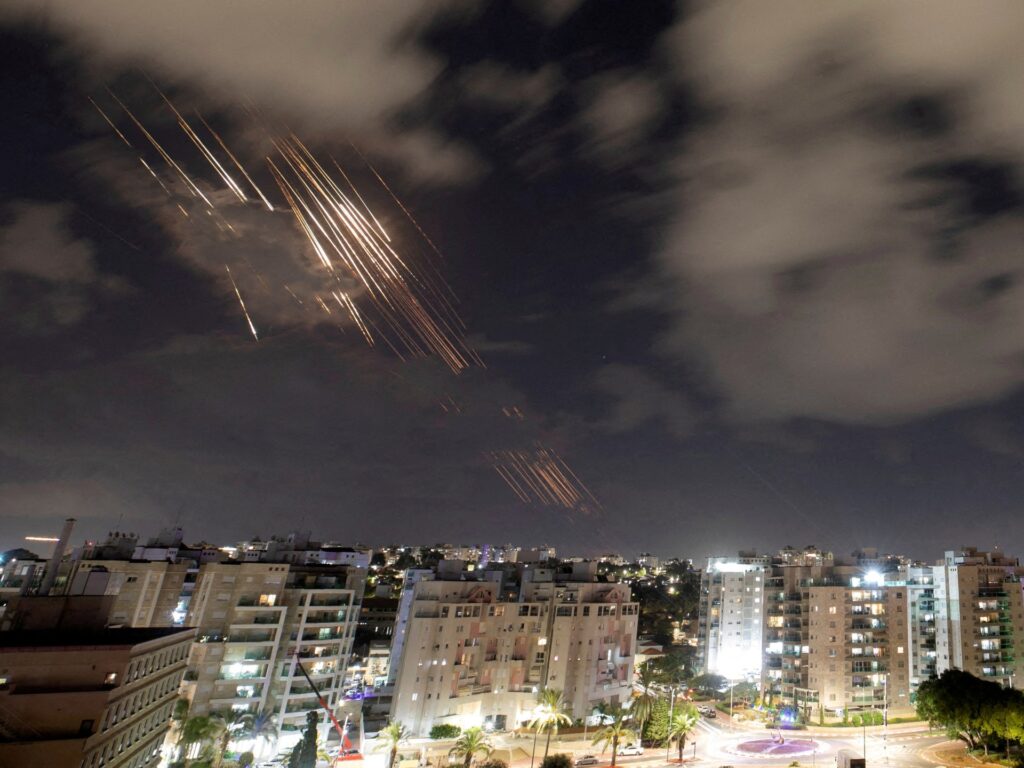
On October 1, Iran launched a massive aerial attack on Israel in retaliation for the assassinations of senior Hezbollah and Hamas leaders and some Iranian officers in Beirut and Tehran.
In anticipation of the attack and to help defend its ally Israel, the United States had expanded its already significant military presence in the Middle East. Its destroyers helped intercept the 180 projectiles Iran fired at military bases in Israel. Such military action has become routine for the US, which has repeatedly intervened in the region in the past decades to directly or indirectly protect Israel.
However, US military interventions have had the opposite of the intended effect: They have made Israel more vulnerable and more dependent on ever greater deployment of American military power. This legacy has also made Israel the most dangerous place in the world for Jews.
This is because the US-Israeli fixation on military force has prevented any efforts to address the core causes of tensions in the region – primarily the Palestinian-Zionist conflict. This has also generated powerful new military actors and popular resistance groups across the Middle East. Hezbollah, Hamas, Ansar Allah (the Houthis) and others now routinely attack both US and Israeli targets.
The power of the axis currently confronting Israel derives not only from its weapons, but also from its close alignment with Arab public opinion. It is willing and able to militarily resist Israel’s occupation and subjugation of Arabs, which no Arab state has done since 1973. All this reflects the decades of American-Israeli aggressions and wars, and Arab governments’ inability to protect their lands, people, and sovereignty.
Washington’s quick and massive military support for Israel perpetuates the cycle of violence and also contradicts its exhortations to de-escalate and seek a ceasefire in Gaza and Lebanon. Few people in the Middle East seriously believe Washington’s words, because its actions more consistently reveal that – with very few exceptions – warfare, sanctions, threats, and military build-ups have been its preferred tools of engagement with real or imagined foes in the region since World War II.
A regional war is steadily developing and the US is not allowing itself to be dragged into it by Israel, but rather it has willingly joined it. This is because the US loves war and loves to go to war for Israel. There are several reasons for this.
Washington has a penchant for warfare because American politicians understand that it boosts the economy. The US defence budget, now nearly $850bn, increases by 2-3 percent annually, for a reason. War drives defence spending, investments, jobs, and profits for hundreds of big and small companies across the country, most of which donate generously to elected officials’ campaigns every two years.
So far, Washington has spent between $1.8bn and $4bn bombing Ansar Allah in Yemen, without stopping their attacks on ships passing through the Red Sea, launched in response to Israel’s genocide in Gaza. The combined Israeli, US, British and French operation to intercept drones and missiles Iran launched against Israel in April cost an estimated $1.1bn. The October 1 military response was likely equally expensive. Some Arab countries also helped intercept Iranian missiles, because Israel alone can no longer protect itself.
Washington spends these large amounts of money willingly, to bolster its global standing and also to keep feeding its expansive military-industrial complex via lucrative contracts for domestic use and foreign export.
The nearly $4bn in US annual aid to Israel also mostly covers war-making systems purchased from American firms, so it constitutes a significant annual cash injection into the US military-industrial complex.
Apart from feeding and flaunting its war machines, the US also loves going to war for Israel for other reasons.
Israel’s close political and military links with the US are partly a lingering remnant of the Cold War, when Israel was seen as a key ally defending US interests in a region dominated by hostile countries allied with the Soviet Union. After the Cold War, Washington continued to view Tel Aviv as a strategic ally that helps maintain US dominance in the Middle East.
US politics are shaped by multiple forces, including Israeli propaganda, lobby groups, messianic Christians, the pro-Israel mainstream media, and others – who also facilitate military action in defence of Israel.
President Joe Biden stands out among recent American presidents as one of the most sincerely fanatical supporters of Israel, for two reasons: because he benefits politically from this stance, and because his formative years in US politics coincided with the height of Israeli propaganda and national achievements in the 1960s and 70s. Israel was still seen then as a divinely aided miracle that emerged from the horrors of the Holocaust in Europe – a view that the US president, who proudly calls himself a Zionist, still holds.
The US Congress also reflects these dynamics. It has ensured the steady flow of generous aid and special economic and technological privileges for Israel, and the legal commitment (PDF) to keep Israel more powerful than all its foes.
US mainstream media has played a central role in keeping the American public ignorant of Palestinian realities, and supportive of Israel and American largesse towards it. It has justified US military adventures abroad and systematically skewed its reporting to accommodate Israeli positions on the conflicts with Palestinians, Lebanon, Iran, and on the Middle East in general.
This latest confrontation will likely not be the last one. As regional conflict flares, the American armadas will continue to visit us regularly and destabilise the region and the world. This legacy of US militarism in the past quarter-century has spawned some 60 military bases and other facilities across the Middle East.
This trend will continue until wiser leaders all around try to resolve the Palestinian-Israeli and US-Iranian conflicts through negotiations anchored in the principle that Israel, Palestine, Iran and all other interested parties must enjoy equal rights of statehood, sovereignty and security. The US and Israel speak vague words along these lines, but act in ways that prevent serious peace-making and promote eternal military conflicts.
The vast majority of Arab public opinion feels strongly that Palestinians must have their sovereign state as part of the process to achieve a regional Arab-Israeli peace. This sentiment is also slowly spreading among the American public, possibly paving the way for a change of policy in Washington.
Indeed, investing in true peace efforts would be easier, more equitable, less expensive, and much less destructive than perpetuating the current colonial situation that is regularly buttressed by visiting American troops. This is the best and probably the only way to guarantee Israel’s security.
The views expressed in this article are the author’s own and do not necessarily reflect Al Jazeera’s editorial stance.








More Stories
Man killed in shooting involving officers in Aurora
3 officers convicted in Tyre Nichols fatal beating but 2 are acquitted of civil rights charges
Aurora Police investigating shooting involving officers